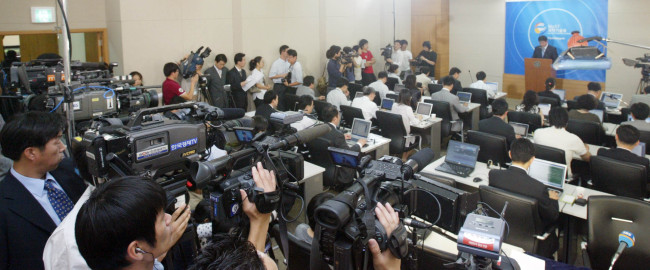A career in journalism in Korea is laden with stress from the word go.
Would-be reporters compete for jobs against odds of hundreds to one, only to be put through seemingly endless training with workdays as long as 20 hours.
Park, a 30-year-old reporter for a daily newspaper, describes his experience as “hell.”
“It was indescribably tough. I don’t think I could do it again. But, the hard experiences made me stronger,” Park said.
“Whenever I face difficulties, I remind myself that nothing can be tougher than the training program.”
Not all make it through the initial phase, with many opting out mid-training.
Although some view the training as unnecessarily harsh, experts say that such programs are made necessary by the unusual recruiting system employed by the Korean media.
Would-be reporters compete for jobs against odds of hundreds to one, only to be put through seemingly endless training with workdays as long as 20 hours.
Park, a 30-year-old reporter for a daily newspaper, describes his experience as “hell.”
“It was indescribably tough. I don’t think I could do it again. But, the hard experiences made me stronger,” Park said.
“Whenever I face difficulties, I remind myself that nothing can be tougher than the training program.”
Not all make it through the initial phase, with many opting out mid-training.
Although some view the training as unnecessarily harsh, experts say that such programs are made necessary by the unusual recruiting system employed by the Korean media.

Unlike many other countries, a degree or background in journalism is not necessary to apply for a journalist’s position. All that is required is to pass aptitude tests individually held by media organizations. The recruitment process usually includes a written exam, a current affairs test, a camera test for broadcasters, and a test requiring applicants to write a story from scratch followed by a series of interviews.
“In most cases, many are untrained in the beginning, as they rarely have a journalism background. In order to raise their journalistic skills in a short time, intensive training is unavoidable,” said communications professor Yang Seong-mock at Seoul National University.
The intense competition typical of Korea also pushes newspapers to push new recruits through tough training programs, he added, as media outlets vie with each other for scoops.
The harsh training, however, is only the beginning.
Pressure mounts to find scoops, and avoid being left out of the loop on beats.
The resulting stress, coupled with unhealthy life choices often associated with journalists in Korea such as excessive drinking, seems to be taking its toll.
According to a 2011 study by researchers at Wonkwang University in North Jeolla Province, journalists are among the shortest-lived professionals in Korea.
The study, which analyzed data for 11 professions between 1963 and 2010, the average age of death was 67 for journalists, putting them at the bottom of the group.
In addition to the pressure to meet deadlines and find stories, Korean journalists often face exclusion from their own kind. Most government organizations, companies and organizations covered by a large number of reporters have their own “reporters’ corps.” The corps get greater access to officials and information ― similar to the lobby system in the U.K. ― and give journalists a united voice in disputes with the organizations, but they sometimes prevent newer news organizations from joining their ranks.
This ever-present pressure, coupled with Korea’s overly competitive social atmosphere sometimes leads to inaccurate or even outright false reports, as clearly demonstrated last month.
When the Sewol ferry sank off the southern coast of the country on April 16, one news outlet reported an hour later that all of the passengers had been rescued. The rest of the media copied the report, without checking the facts.
After it later came out that only 174 of the 476 people on board had been rescued, the media came under fire over for lacking credibility.
“They need to pursue ‘accountability journalism’ ― which involves a reporter’s responsibility and social duties. That is the only way to recover the news’ credibility,” SNU’s Yang said.
By Lee Hyun-jeong (rene@heraldcorp.com)
-
Articles by Korea Herald



![[Exclusive] Korean military set to ban iPhones over 'security' concerns](http://res.heraldm.com/phpwas/restmb_idxmake.php?idx=644&simg=/content/image/2024/04/23/20240423050599_0.jpg&u=20240423183955)

![[Graphic News] 77% of young Koreans still financially dependent](http://res.heraldm.com/phpwas/restmb_idxmake.php?idx=644&simg=/content/image/2024/04/22/20240422050762_0.gif&u=)



![[Pressure points] Leggings in public: Fashion statement or social faux pas?](http://res.heraldm.com/phpwas/restmb_idxmake.php?idx=644&simg=/content/image/2024/04/23/20240423050669_0.jpg&u=)










